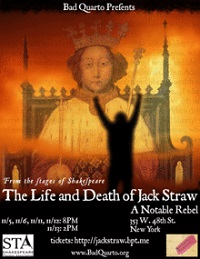The Life and Death of Jack Straw is a play about the corruptability of power, and how even the most well
intentioned person can be corrupted by it. At the beginning of the play, Jack Straw is an impoverished father
protecting his daughter from sexual assault at the hands of a royal official, but while the Peasants Revolt begins
with an earnest desire to appeal to the still juvenile Richard II to remove these wicked counselors who abuse their power,
it quickly descends into a Bacchanalia of murder, theft, and wanton destruction. In just three scenes, the leaders of the
revolt turn to pillage.
King Richard, for his part, is awakened into adulthood with the realization that his people don't love him as he loves them,
and struggles with the reality that he has been inattentive to their needs. Though little more than a boy, Richard learns that
he cannot trust the management of his kingdom to others, even though he knows he does not have the experience or power yet to
govern on his own.
In this way, The Life and Death of Jack Straw is a play without a performance history that speaks loud and clear
to our modern world. Income inequality, repressed populations pushed to the breaking point, and the apparent casual murders
of vulnerable people by a militarized police force, coupled with new levels of globalization and legislation aimed at bolstering
buisiness interests at the expense of workers make early 21st century America disturbingly similar to late 14th century and late
16th century England. I just hope it's not too late for us to learn the lessons the play has to offer us.
The Life and Death of Jack Straw was first printed in London in 1594, although it was registered with the Stationer's
Company in 1593, perhaps accounting for the discrepancy in the title page. Unlike many plays of the early 1590s,
great care was taken in the printing of this text: it is in the quarto copy broken into four separate acts, and the
King's Pardon to the Rebels is offset from the rest of the text. Both times Jack Straw was printed (the other being
in 1604), it was printed without reference to a playing company, a playwright, or any specific performance. This could
very well be its first staging in 400 years.
(hide)

